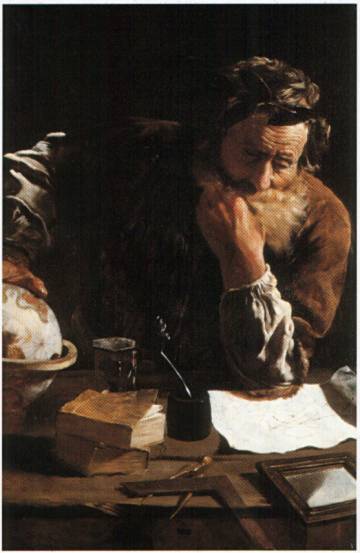On Samos every soul is soon at ease.
Our girls flock to golden beaches,
free to sing and dance and tease.
Our food, rich and of superb taste,
is aplenty for both master and slave
and life flows with little haste.
Yet Aristarchus, a fellow Citizen,
wallows in endless mental pain.
Like an unfortunate Hades denizen
he strives to unlock mysteries
our simple minds find of no avail.
The man never gives you a clue
whether he is serious or poking fun.
He utters all kinds of statements
about the Earth and Moon and Sun
which offend the Gods and
make you think he must be dumb.
Take his claim that Gaia is round like a ball.
Why, it's vulgar and void of any grace!
Just think about the mighty seas and all
the water dripping off her nether face.
Does Helios pass daily by your yard,
dispensing gaiety and warmth?
If you say Yes, you got it wrong!
Aristarchus has Him sitting still and lame
while Gaia spins around like a dancing girl,
escorted by a planets throng.
Your eyes insist that Helios is leaner than Silene,
the pale companion of pensive minds?
Don't trust them, they tell you lies!
For, Aristarchus says, Helios is bulkier than Gaia
(maybe as much as seven times!)
while Silene is a child hardly half her size.
Oh yes, the stories Aristarchus tells
are amusing, no doubt about that!
That's why Archimedes of Syracuse,
the youngster who dared the waves
on a ship manned by just twenty slaves
has them written into the finest clay
by a scribe who studied in Athens
and speaks in an awfully affected way.
We all hope that Gods will have mercy
with an old man whose mind went astray
like an eager hunter misled by his prey.
|
Aristarchus of Samos

Painting by Domenico Fetti,
oil on canvas 98 x 73.5 cm.
The original of this painting
can be seen in
Staatliche Kunstsammlungen,
Dresden, Germany
|
|
Stan Sýkora, Arese 1996, painting by Domenico Fetti
| |
|